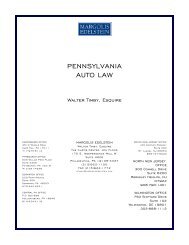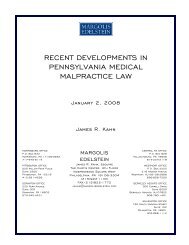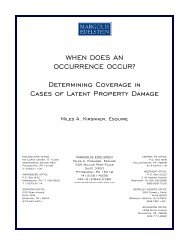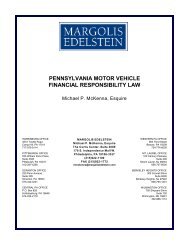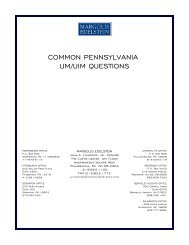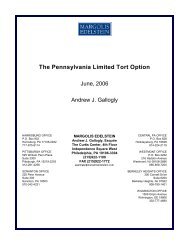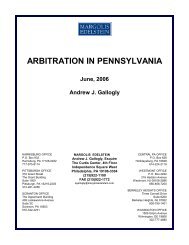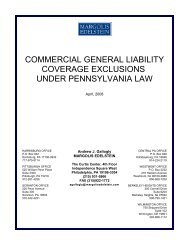selected topics in pennsylvania legal malpractice law - Margolis ...
selected topics in pennsylvania legal malpractice law - Margolis ...
selected topics in pennsylvania legal malpractice law - Margolis ...
You also want an ePaper? Increase the reach of your titles
YUMPU automatically turns print PDFs into web optimized ePapers that Google loves.
cause. The attorney was under no duty to verify the accuracy of his client’s representations by<br />
speak<strong>in</strong>g to the doctor. Hong v. Pelagatti, 765 A. 2d 1171 (Pa. Super. 2000).<br />
Whether voluntary withdrawal of a claim is a favorable term<strong>in</strong>ation depends upon the<br />
circumstances. The withdrawal is considered a favorable where it was made “<strong>in</strong> the face of<br />
imm<strong>in</strong>ent defeat”. Bannar v. Miller, 701 A.2d 232 (Pa. Super. 1997).<br />
A certificate of merit is not required for a Wrongful Use of Civil Proceed<strong>in</strong>gs claim. Sabella<br />
v. Estate of Milides, 992 A. 2d 180 ( Pa. Super. 2010).<br />
A claim of abuse of process relates to the improper use of process after proceed<strong>in</strong>gs have<br />
started. The action is grounded upon wrongful use of legitimate process of the court. It is<br />
dist<strong>in</strong>guished from wrongful use of civil proceed<strong>in</strong>gs, which relates to the improper commencement<br />
of a <strong>law</strong>suit without probable cause and with malicious motive to harm the opponent. Abuse of<br />
process deals with perversion of the legitimate process of the court for an improper purpose. To<br />
establish a claim for abuse of process it must be shown that the defendant 1) used a <strong>legal</strong> process<br />
aga<strong>in</strong>st the pla<strong>in</strong>tiff, 2) primarily to accomplish a purpose for which the process was not designed,<br />
and 3) harm has been caused to the pla<strong>in</strong>tiff. Cruz v. Pr<strong>in</strong>ceton Ins. Co., 925 A.2d 853 (Pa. Super.<br />
2007); Werner v. Plater-Zybeck, 799 A.2d 776 (Pa. Super. 2002); Sh<strong>in</strong>er v. Moriarty, 706 A.2d<br />
1228 (Pa. Super. 1998); Rosen v. American Bank of Rolla, 426 Pa. Super.376, 627 A. 2d 190<br />
(1993).<br />
Abuse of process is, <strong>in</strong> essence, the use of <strong>legal</strong> process as a tactical weapon to coerce a<br />
desired result that is not the legitimate object of the process. McGee v. Fegee, 517 Pa. 247, 259,<br />
535 A.2d 1020 (1987). In abuse of process cases, the misconduct for which liability is imposed<br />
is not the wrongful procurement of <strong>legal</strong> process or the wrongful <strong>in</strong>itiation of crim<strong>in</strong>al or civil<br />
proceed<strong>in</strong>gs; it is the misuse of process, even if properly obta<strong>in</strong>ed, for any purpose other than that<br />
which it was designed to accomplish. It is immaterial that the process was properly issued, that it<br />
was obta<strong>in</strong>ed <strong>in</strong> the course of proceed<strong>in</strong>gs that were brought with probable cause and for a proper<br />
purpose, or even that the proceed<strong>in</strong>gs term<strong>in</strong>ated <strong>in</strong> favor of the person <strong>in</strong>stitut<strong>in</strong>g or <strong>in</strong>itiat<strong>in</strong>g them.<br />
Sabella v. Estate of Milides, 992 A. 2d 180 (Pa. Super. 2010); Lerner v. Lerner, 954 A.2d 1229<br />
(Pa. Super. 2008).<br />
-17-



